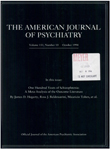Correlates of persistent depressive symptoms in widows
Abstract
OBJECTIVE: Delineation of factors that predict depressive symptom severity 6 or more months after the loss of a spouse may help identify individuals at risk for persistent depressive symptoms. In this study, sociodemographic and clinical correlates of depressive symptom severity were examined among widows 6 to 16 months after the deaths of their husbands. METHOD: The 50 subjects were identified from the Allegheny County, Penn., death records and were interviewed by telephone. The authors examined the relationship of depressive symptoms to sociodemographic variables, perceptions of sex role and quality of social supports, level of support sought for bereavement, and premorbid personal and family psychiatric history. RESULTS: Widows with persistent depressive symptoms were less likely to have worked outside the home, had less favorable perceptions of their interpersonal support systems, were more likely to have had previous psychiatric disorders, and were likely to have sought professional help in response to their bereavement. In a multivariate model, only premorbid psychiatric history and the perception of interpersonal support system made independent contributions to the prediction of Beck Depression Inventory scores above the normal range. CONCLUSIONS: These results suggest several factors that may identify women at risk of protracted psychiatric morbidity after their husbands' deaths. They also suggest that the persistence of depressive symptoms an average of 1 year after the loss of a spouse may reflect a pathological condition rather than normal grieving.
Access content
To read the fulltext, please use one of the options below to sign in or purchase access.- Personal login
- Institutional Login
- Sign in via OpenAthens
- Register for access
-
Please login/register if you wish to pair your device and check access availability.
Not a subscriber?
PsychiatryOnline subscription options offer access to the DSM-5 library, books, journals, CME, and patient resources. This all-in-one virtual library provides psychiatrists and mental health professionals with key resources for diagnosis, treatment, research, and professional development.
Need more help? PsychiatryOnline Customer Service may be reached by emailing [email protected] or by calling 800-368-5777 (in the U.S.) or 703-907-7322 (outside the U.S.).



